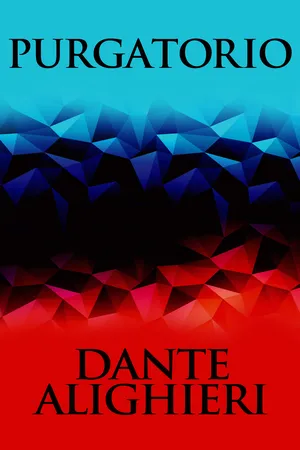
- 277 pages
- English
- ePUB (mobile friendly)
- Available on iOS & Android
Purgatorio
About this book
Purgatorio is the second part of The Divine Comedy, Dante's epic poem describing man's progress from hell to paradise. Having escaped the Inferno, Dante and his guide, the classical Roman poet Virgil, ascend out of the underworld to the Mountain of Purgatory on an island on the far side of the world. The mountain has nine terraces, seven of which correspond to the seven deadly sins, and two of which constitute an Ante-Purgatory with the Garden of Eden at the summit. Dante writes about sin based on motives in Purgatory, rather than actions as in The Inferno, giving the book a more psychological aspect. Arriving on Easter Sunday, Purgatorio represents the time of human life on earth.
Tools to learn more effectively

Saving Books

Keyword Search

Annotating Text

Listen to it instead
Information
The light bark of my genius lifts the sail,
Well pleas'd to leave so cruel sea behind;
And of that second region will I sing,
In which the human spirit from sinful blot
Is purg'd, and for ascent to Heaven prepares.
Here, O ye hallow'd Nine! for in your train
I follow, here the deadened strain revive;
Nor let Calliope refuse to sound
A somewhat higher song, of that loud tone,
Which when the wretched birds of chattering note
Had heard, they of forgiveness lost all hope.
Sweet hue of eastern sapphire, that was spread
O'er the serene aspect of the pure air,
High up as the first circle, to mine eyes
Unwonted joy renew'd, soon as I 'scap'd
Forth from the atmosphere of deadly gloom,
That had mine eyes and bosom fill'd with grief.
The radiant planet, that to love invites,
Made all the orient laugh, and veil'd beneath
The Pisces' light, that in his escort came.
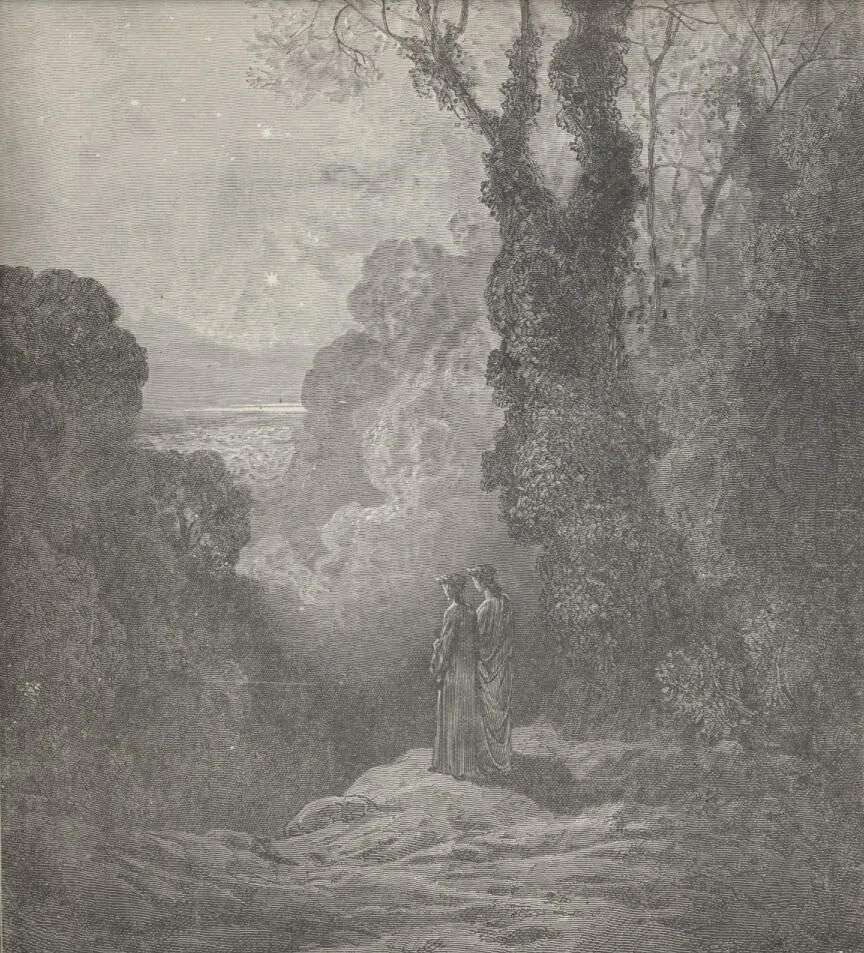
On the other pole attentive, where I saw
Four stars ne'er seen before save by the ken
Of our first parents. Heaven of their rays
Seem'd joyous. O thou northern site! bereft
Indeed, and widow'd, since of these depriv'd.
As from this view I had desisted, straight
Turning a little toward the other pole,
There from whence now the wain had disappear'd,
I saw an old man standing by my side
Alone, so worthy of rev'rence in his look,
That ne'er from son to father more was ow'd.
Low down his beard, and mix'd with hoary white,
Descended, like his locks, which, parting, fell
Upon his breast in double fold. The beams
Of those four luminaries on his face
So brightly shone, and with such radiance clear
Deck'd it, that I beheld him as the sun.
"Say who are ye, that stemming the blind stream,
Forth from the eternal prison-house have fled?"
He spoke and moved those venerable plumes.
"Who hath conducted, or with lantern sure
Lights you emerging from the depth of night,
That makes the infernal valley ever black?
Are the firm statutes of the dread abyss
Broken, or in high heaven new laws ordain'd,
That thus, condemn'd, ye to my caves approach?"
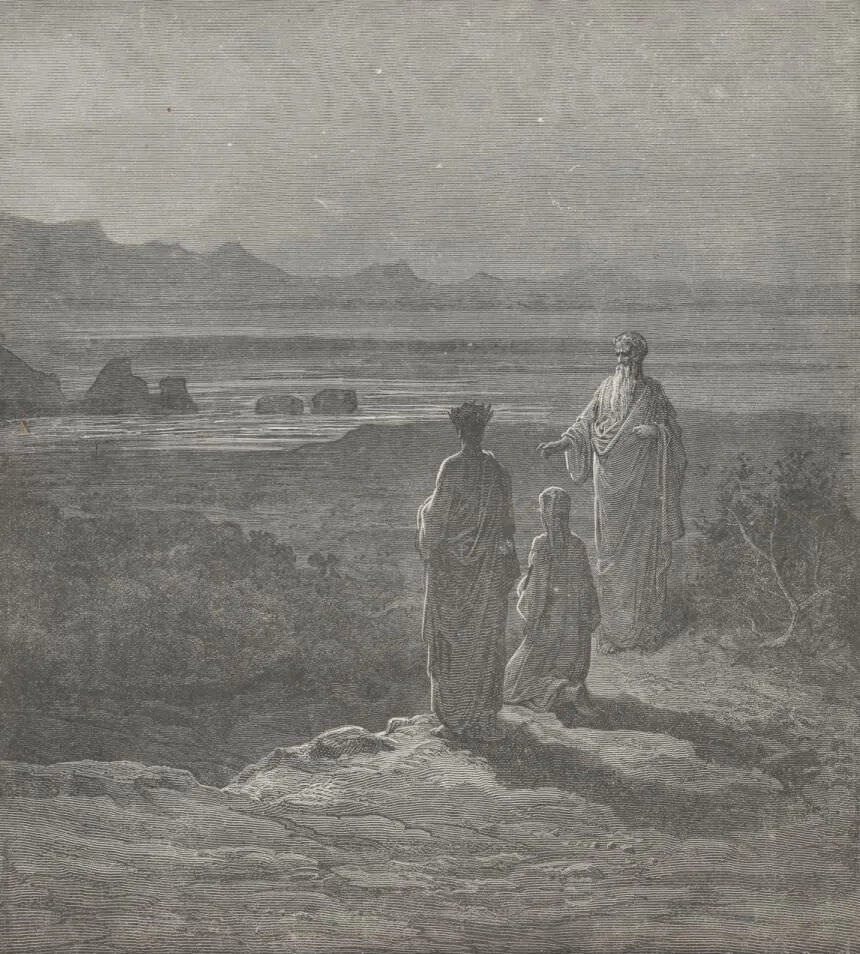
And intimations given with hand and head,
Made my bent knees and eye submissive pay
Due reverence; then thus to him replied:
"Not of myself I come; a Dame from heaven
Descending, him besought me in my charge
To bring. But since thy will implies, that more
Our true condition I unfold at large,
Mine is not to deny thee thy request.
This mortal ne'er hath seen the furthest gloom;
But erring by his folly had approach'd
So near, that little space was left to turn.
Then, as before I told, I was dispatch'd
To work his rescue; and no way remain'd
Save this which I have ta'en. I have display'd
Before him all the regions of the bad;
And purpose now those spirits to display,
That under thy command are purg'd from sin.
How I have brought him would be long to say.
From high descends the virtue, by whose aid
I to thy sight and hearing him have led.
Now may our coming please thee. In the search
Of liberty he journeys: that how dear,
They know who for her sake have life refus'd.
Thou knowest, to whom death for her was sweet
In Utica, where thou didst leave those weeds,
That in the last great day will shine so bright.
He breathes, and I of Minos am not bound,
For us the eternal edicts are unmov'd
Abiding in that circle, where the eyes
Of thy chaste Marcia beam, who still in look
Prays thee, O hallow'd spirit! to own her thine.
Then by her love we' implore thee, let us pass
Through thy sev'n regions; for which best thanks
I for thy favour will to her return,
If mention there below thou not disdain."
"Marcia so pleasing in my sight was found,"
He then to him rejoin'd, "while I was there,
That all she ask'd me I was fain to grant.
Now that beyond the accursed stream she dwells,
She may no longer move me, by that law,
Which was ordain'd me, when I issued thence.
Not so, if Dame from heaven, as thou sayst,
Moves and directs thee; then no flattery needs.
Enough for me that in her name thou ask.
Go therefore now: and with a slender reed
See that thou duly gird him, and his face
Lave, till all sordid stain thou wipe from thence.
For not with eye, by any cloud obscur'd,
Would it be seemly before him to come,
Who stands the foremost minister in Heaven.
This islet all around, there far beneath,
Where the wave beats it, on the oozy bed
Produces store of reeds. No other plant,
Cover'd with leaves, or harden'd in its stalk,
There lives, not bending to the water's sway.
After, this way return not; but the sun
Will show you, that now rises, where to take
The mountain in its easiest ascent."
He disappear'd; and I myself uprais'd
Speechless, and to my guide retiring close,
Toward him turn'd mine eyes. He thus began:
"My son! observant thou my steps pursue.
We must retreat to rearward, for that way
The champain to its low extreme declines."
The dawn had chas'd the matin hour of prime,
Which deaf before it, so that from afar
I spy'd the trembling of the ocean stream.
We travers'd the deserted plain, as one
Who, wander'd from his track, thinks every step
Trodden in vain till he regain the path.
When we had come, where yet the tender dew
Strove with the sun, and in a place where fresh
The wind breath'd o'er it, while it slowly dried;
Both hands extended on the watery grass
My master placed, in graceful act and kind.
Whence I of his intent before apprised,
Stretch'd out to him my cheeks suffus'd with tears.
There to my visage he anew restor'd
That hue which the dun shades of hell conceal'd.
Then on the solitary shore arriv'd,
That never sailing on its waters saw
Man that could after measure back his course,
He girt me in such manner as had pleas'd
Him who instructed; and, oh strange to tell!
As he selected every humble plant,
Wherever one was pluck'd another there
Resembling, straightway in its place arose.
That covers, with the most exalted point
Of its meridian circle, Salem's walls;
And night, that opposite to him her orb
Rounds, from the stream of Ganges issued forth,
Holding the scales, that from her hands are dropp'd
When she reigns highest: so that where I was,
Aurora's white and vermeil-tinctur'd cheek
To orange turn'd as she in age increas'd.
Meanwhile we linger'd by the water's brink,
Like men, who, musing on their road, in thought
Journey, while motionless the body rests.
When lo! as near upon the hour of dawn,
Through the thick vapours Mars with fiery beam
Glares down in the West, over the ocean floor;
So seem'd, what once again I hope to view,
A light, so swiftly coming through the sea,
No winged course might equal its career.
From which when for a space I had withdrawn
Mine eyes, to make inquiry of my guide,
Again I look'd, and saw it grown in size
And brightness: then on either side appear'd
Something, but that I knew not, of bright hue,
And by degrees from underneath it came
Another. My preceptor silent yet
Stood, while the brightness, that we first discern'd,
Open'd the form of wings: then when he knew
The pilot, cried aloud, "Down! Down! Bend low
Thy knees! Behold God's angel! Fold thy hands!
Now shalt thou see true ministers indeed!
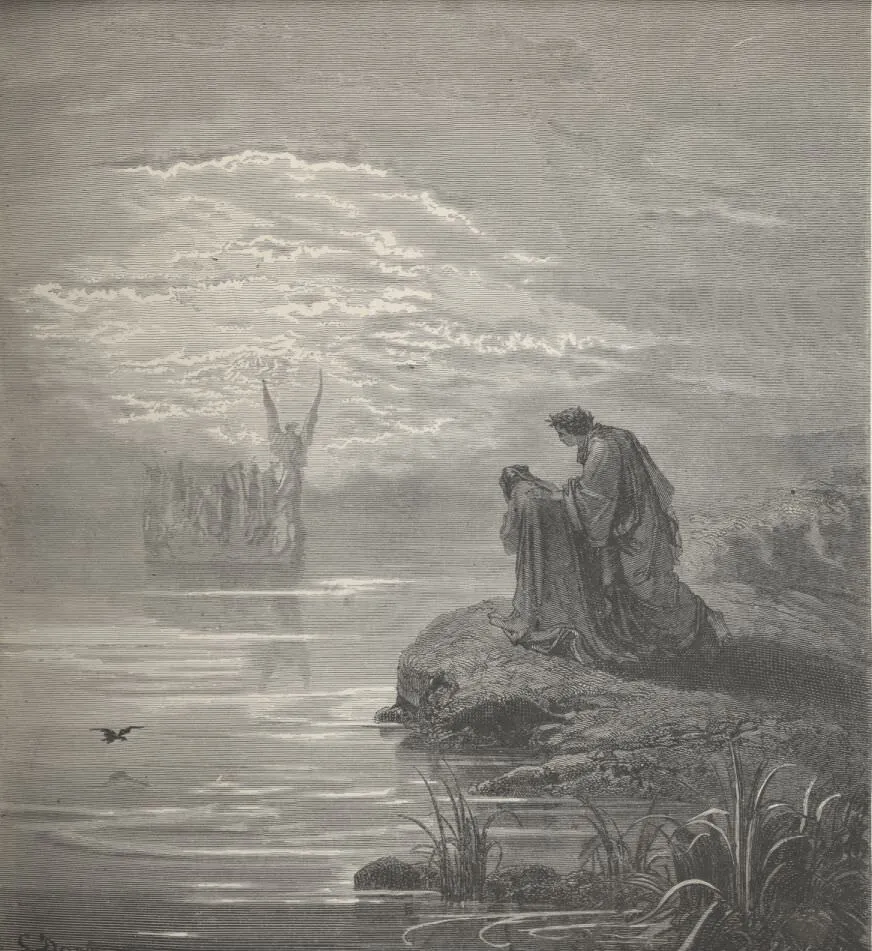
So that nor oar he needs, nor other sail
Except his wings, between such distant shores.
Lo! how straight up to heaven he holds them rear'd,
Winnowing the air with those eternal plumes,
That not like mortal hairs fall off or change."
As more and more toward us came, more bright
Appear'd the bird of God, nor could the eye
Endure his splendor near: I mine bent down.
He drove ashore in a small bark so swift
And light, that in its course no wave it drank.
The heav'nly steersman at the prow was seen,
Visibly written “Blessed” in his looks.
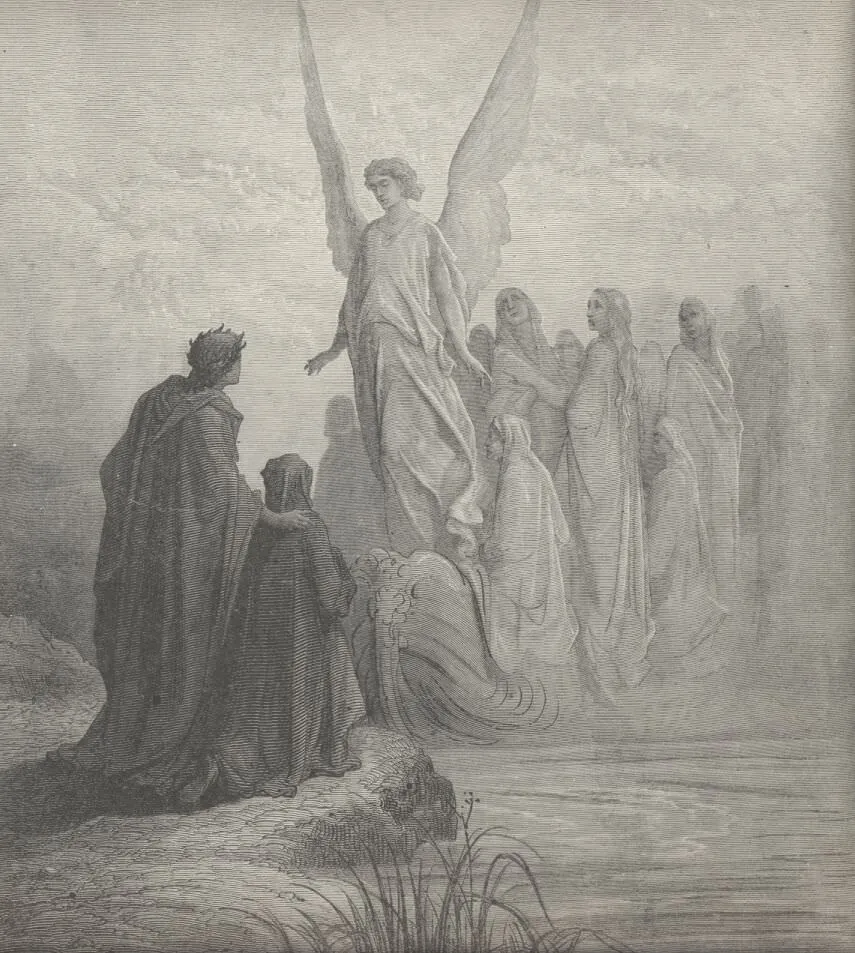
"In Exitu Israel de Egypto;"
All with one voice together sang, with what
In the remainder of that hymn is writ.
Then soon as with the sign of holy cross
He bless'd them, they at once leap'd out on land:
He, swiftly as he came, return'd. The crew,
There left, appear'd astounded with the place,
Gazing around, as one who sees new sights.
From every side the sun darted his beams,
And with his arrowy radiance from mid heav'n
Had chas'd the Capricorn, when that strange tribe,
Lifting their eyes toward us: "If ye know,
Declare what path will lead us to the mount."
Them Virgil answer'd: "Ye suppose, perchance,
Us well acquainted with this place: but here,
We, as yourselves, are strangers. Not long erst
We came, before you but a little space,
By other road so rough and hard, that now
The ascent will seem to us as play." The spirits,
Who from my breathing had perceiv'd I liv'd,
Grew pale with wonder. As the multitude
Flock round a herald sent with olive branch,
To hear what news he brings, and in their haste
Tread one another down; e'en so at sight
Of me those happy spirits were fix'd, each one
Forgetful of its errand to depart
Where, cleans'd from sin, it might be made all fair.
Then one I saw darting before the rest
With such fond ardour to embrace me, I
To do the like was mov'd. O shadows vain!
Except in outward semblance: thrice my hands
I clasp'd behind it, they as oft return'd
Empty into my breast again. Surprise
I need must think was painted in my looks,
For...
Table of contents
- Title
- About Dante Alighieri
- Table of Contents
- Canto 1
- Canto 2
- Canto 3
- Canto 4
- Canto 5
- Canto 6
- Canto 7
- Canto 8
- Canto 9
- Canto 10
- Canto 11
- Canto 12
- Canto 13
- Canto 14
- Canto 15
- Canto 16
- Canto 17
- Canto 18
- Canto 19
- Canto 20
- Canto 21
- Canto 22
- Canto 23
- Canto 24
- Canto 25
- Canto 26
- Canto 27
- Canto 28
- Canto 29
- Canto 30
- Canto 31
- Canto 32
- Canto 33
Frequently asked questions
- Essential is ideal for learners and professionals who enjoy exploring a wide range of subjects. Access the Essential Library with 800,000+ trusted titles and best-sellers across business, personal growth, and the humanities. Includes unlimited reading time and Standard Read Aloud voice.
- Complete: Perfect for advanced learners and researchers needing full, unrestricted access. Unlock 1.4M+ books across hundreds of subjects, including academic and specialized titles. The Complete Plan also includes advanced features like Premium Read Aloud and Research Assistant.
Please note we cannot support devices running on iOS 13 and Android 7 or earlier. Learn more about using the app